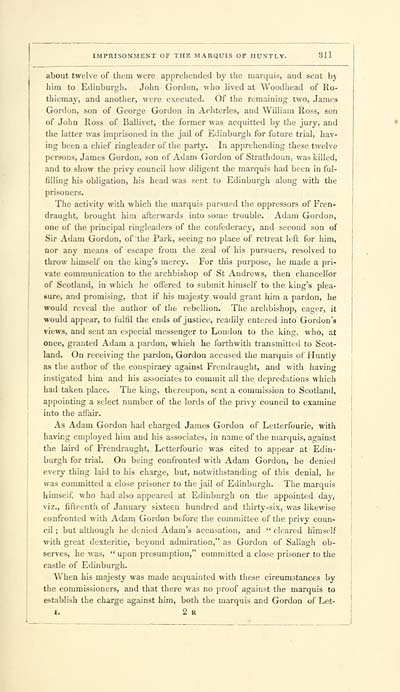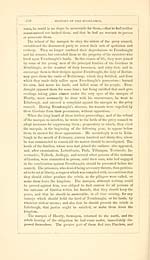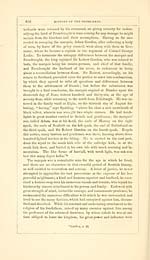Download files
Complete book:
Individual page:
Thumbnail gallery: Grid view | List view

IMPRISONMENT OF THE MARQUIS OF HUNTLY.
311
about twelve of them were apprehended by the marquis, and sent bj
him to Edinburgh. John Gordon, who lived at Woodliead of Ro-
thiemay, and another, were executed. Of the remaining two, James
Gordon, son of George Gordon in Aehterles, and William Ross, son
of John Ross of Ballivet, the former was acquitted by tlie jury, and
the latter was imprisoned in the jail of Edinburgli for future trial, hav-
ing been a chief ringleader of the party. In apprehending these twelve
persons, James Gordon, son of Adam Gordon of Strathdoun, was killed,
and to show the privy council liow diligent tlie marquis had been in ful-
filling his obligation, his head was sent to Edinburgh along with the
prisoners.
Tlie activity with which the marquis pursued tlie oppressors of Fren-
draught, brought him afterwards into some trouble. Adam Gordon,
one of the principal ringleaders of the confederacy, and second son of
Sir Adam Gordon, of the Park, seeing no place of retreat left for him,
nor any means of escape from the zeal of his pursuers, resolved to
throw himself on the king's mercy. For this purpose, he made a pri-
vate communication to the archbishop of St Andrews, then chancellor
of Scotland, in which he offered to submit himself to the king's plea-
sure, and promising, that if his majesty would grant him a pardon, he
would reveal the author of the rebellion. The arclibishop, eager, it
would appear, to fulfil the ends of justice, readily entered into Gordon's
views, and sent an especial messenger to London to the king, who, at
once, granted Adam a pardon, which he forthwith transmitted to Scot-
land. On receiving the pardon, Gordon accused the marquis of Huntly
as the author of the conspiracy against Frentlraught, and with liaving
instigated him and his associates to commit all the depredations which
had taken place. The king, thereupon, sent a commission to Scotland,
appointing a select number of the lords of the privy council to examine
into the affair.
As Adam Gordon had charged James Gordon of Letterfourie, with
having employed him and his associates, in name of the marquis, against
tlie laird of Frendraught, Letterfourie was cited to appear at Edin-
burgh for trial. On being confronted with Adam Gordon, he denied
every thing laid to his charge, but, notwithstanding of this denial, he
uas committed a close prisoner to the jail of Edinburgh. The marquis
himself, who had also appeared at Edinburgh on the appointed day,
viz., fifteenth of January sixteen hundred and thirty-six, was likewise
confronted with Adam Gordon before the committee of the privy coun-
cil ; but although he denied Adam's accusation, and " cleared himself
with great dexteritie, beyond admiration," as Gordon of Sallagh ob-
serves, he was, " upon presumption," committed a close prisoner to the
castle of Edinburgh.
When his majesty was made acquainted with these circumstances by
the commissioners, and that there was no proof against the marquis to
establish the charge against him, both the marquis and Gordon of Let-
I. 2 R
311
about twelve of them were apprehended by the marquis, and sent bj
him to Edinburgh. John Gordon, who lived at Woodliead of Ro-
thiemay, and another, were executed. Of the remaining two, James
Gordon, son of George Gordon in Aehterles, and William Ross, son
of John Ross of Ballivet, the former was acquitted by tlie jury, and
the latter was imprisoned in the jail of Edinburgli for future trial, hav-
ing been a chief ringleader of the party. In apprehending these twelve
persons, James Gordon, son of Adam Gordon of Strathdoun, was killed,
and to show the privy council liow diligent tlie marquis had been in ful-
filling his obligation, his head was sent to Edinburgh along with the
prisoners.
Tlie activity with which the marquis pursued tlie oppressors of Fren-
draught, brought him afterwards into some trouble. Adam Gordon,
one of the principal ringleaders of the confederacy, and second son of
Sir Adam Gordon, of the Park, seeing no place of retreat left for him,
nor any means of escape from the zeal of his pursuers, resolved to
throw himself on the king's mercy. For this purpose, he made a pri-
vate communication to the archbishop of St Andrews, then chancellor
of Scotland, in which he offered to submit himself to the king's plea-
sure, and promising, that if his majesty would grant him a pardon, he
would reveal the author of the rebellion. The arclibishop, eager, it
would appear, to fulfil the ends of justice, readily entered into Gordon's
views, and sent an especial messenger to London to the king, who, at
once, granted Adam a pardon, which he forthwith transmitted to Scot-
land. On receiving the pardon, Gordon accused the marquis of Huntly
as the author of the conspiracy against Frentlraught, and with liaving
instigated him and his associates to commit all the depredations which
had taken place. The king, thereupon, sent a commission to Scotland,
appointing a select number of the lords of the privy council to examine
into the affair.
As Adam Gordon had charged James Gordon of Letterfourie, with
having employed him and his associates, in name of the marquis, against
tlie laird of Frendraught, Letterfourie was cited to appear at Edin-
burgh for trial. On being confronted with Adam Gordon, he denied
every thing laid to his charge, but, notwithstanding of this denial, he
uas committed a close prisoner to the jail of Edinburgh. The marquis
himself, who had also appeared at Edinburgh on the appointed day,
viz., fifteenth of January sixteen hundred and thirty-six, was likewise
confronted with Adam Gordon before the committee of the privy coun-
cil ; but although he denied Adam's accusation, and " cleared himself
with great dexteritie, beyond admiration," as Gordon of Sallagh ob-
serves, he was, " upon presumption," committed a close prisoner to the
castle of Edinburgh.
When his majesty was made acquainted with these circumstances by
the commissioners, and that there was no proof against the marquis to
establish the charge against him, both the marquis and Gordon of Let-
I. 2 R
Set display mode to: Large image | Transcription
Images and transcriptions on this page, including medium image downloads, may be used under the Creative Commons Attribution 4.0 International Licence unless otherwise stated. ![]()
| Early Gaelic Book Collections > Ossian Collection > History of the Highlands and of the Highland clans > Volume 1 > (425) |
|---|
| Permanent URL | https://digital.nls.uk/79677697 |
|---|
| Description | Vol. I. |
|---|---|
| Shelfmark | Oss.247 |
| Additional NLS resources: | |
| Attribution and copyright: |
|
| Description | Selected books from the Ossian Collection of 327 volumes, originally assembled by J. Norman Methven of Perth. Different editions and translations of James MacPherson's epic poem 'Ossian', some with a map of the 'Kingdom of Connor'. Also secondary material relating to Ossianic poetry and the Ossian controversy. |
|---|
| Description | Selected items from five 'Special and Named Printed Collections'. Includes books in Gaelic and other Celtic languages, works about the Gaels, their languages, literature, culture and history. |
|---|

